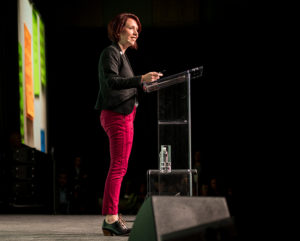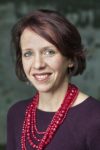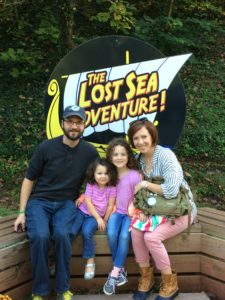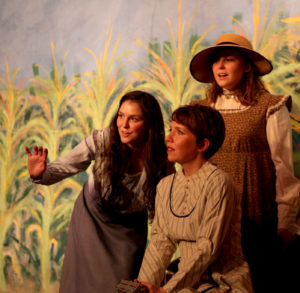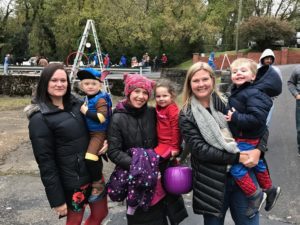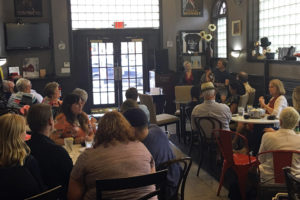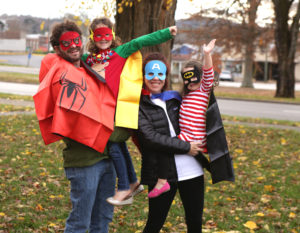On October 31, 2017, at the opening session of the first Obama Foundation Summit, Whitney Kimball Coe delivered a very personal and impassioned speech about the experience of moving back home, as a young adult, to her small hometown of Athens, Tennessee. She regaled the audience, which included Barack and Michelle Obama, with stories of the challenges and rich rewards that come with putting down new roots in rural America.
What follows are a video and the transcripts of Whitney’s speech.
I remember the day when I told my parents that I had changed my mind about everything. I was 20 years old, a sophomore at Queens University of Charlotte, and I wanted to come home. Well, not at that moment. I wanted to finish school. But after that I wanted to find my way back to my hometown of Athens, Tennessee, population about 13,000, in the valley of the Southeast Tennessee area.
I was nervous to say it out loud. This was a reversal of everything I had been professing up until that moment. Since I was 6 years old, I had been conditioning myself for a life of great success in a big city somewhere. It was never a question in my family that I was going to leave my home for good. But on this day, sitting on the floor in my sophomore dorm room, I called my parents to tell them that I had changed my mind.
This is the point where many rural parents would likely hold their ground and say, “Oh, no, honey, don’t you remember what it was like living here? We can’t give you all of the opportunities you are going to find out there. Why don’t you just think a little bit longer about this decision?” But my parents didn’t say that. Instead they said, “We’d love it if you came home to Athens.”
I was so relieved to hear that, because I needed Athens.
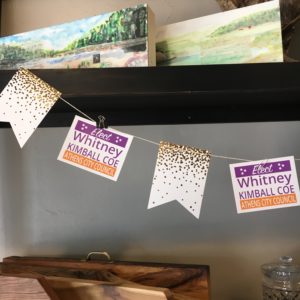 I’m home now, building a life with my husband, Matt Coe, and my two daughters, Lucy and Susannah. My parents live one street over. And my brother Andrew and my sister-in-law live right behind us. When I ran for a seat on the Athens City Council, our neighborhood was full of “With Whit” campaign signs. I didn’t win a seat, but I fell in love with my community all over again.
I’m home now, building a life with my husband, Matt Coe, and my two daughters, Lucy and Susannah. My parents live one street over. And my brother Andrew and my sister-in-law live right behind us. When I ran for a seat on the Athens City Council, our neighborhood was full of “With Whit” campaign signs. I didn’t win a seat, but I fell in love with my community all over again.
Athens is still pretty much the same as I remember. It still has a lot of the cultural markers of a small town. We like to stay within sight and sound of each other. A trip to the grocery store is like going to church. You know it’s going to take longer than you think it will, because you are going to see everyone you know. We’re also an intergenerational place, and everyone wears multiple hats. So I can serve on the Friends of the Library board with my first-grade teacher and work backstage at the local arts center with my OB-GYN. You don’t have to belong to or attend church, but people will know who goes where and how often they are in the pews. And when catastrophe strikes, like the tornado that hit us in 2016, we pull out all the stops for our neighbors.
There is nothing fancy or cutting edge about my community. We have more amenities than some rural areas and less than others. Rural people walk a hard line between disparity and abundance. In the U.S. we are nearly 20 percent of the population and about 80 percent of the land. Yet we have historically been bypassed by government and exploited by big companies that have extracted our resources and left precious little investment behind. We know about trauma and addiction and suicide. We know about shuttered hospitals and crappy roads and underfunded schools and spotty broadband. And we know that one in four rural kids lives in poverty. Those are our kids and our youth who are told they have to leave to save their lives. That’s all part of the rural story.
But also a part of our story is what I call a practice of participation. We can’t control the systemic barriers and disparities that hunt us and haunt us. We can’t control the forces of automation and globalization that have taken our livelihoods and our jobs. But we can control our response to these forces. And usually that means we just keep participating. We keep showing up. At funerals and potlucks. At PTA meetings and choir practice. At football games and city council meetings. We keep checking out library books and performing in community theater productions. We make our plans “for here and about here,” as writer Jo Carson says. And that regular practice of participation is what characterizes our relationships, and that gives us the ability to live and work and worship together in spite of disagreements. It helps us withstand the tangles of partisanship, too. It’s hard to dismiss someone when you expect to see them the next day, and the day after that, and the day after that.
I hope you are not hearing me say that rural futures are secure because we have community spirit. I’m not saying that. Rural people are pissed as hell about the shape of our economies and our infrastructure, and we are deeply worried about our children. There is absolutely a role for thoughtful government and philanthropic participation in this story. Better policies and more investment are critical for our future in rural places, especially if we want our young people to come home.
But what pulled me back to Athens is that deep knowledge that we already have something essential in place. I believe there is something incredibly powerful about the way we show up with each other in small, daily ways. The way we stay within sight and sound of each other. It’s a practice. That’s the only word I can think of to describe what we do.
Contemplative scholar and teacher James Finley offered the lesson this way: “Find your practice and practice it. Find your teaching and follow it. Find your community and join it.”
I watched my dad, Art Kimball, head to work in the dark hours of the morning most of my life. He’s a community banker, and he’s retiring today after more than 45 years of investing in the community. When he’d get off work, he’d go to the next thing: Wednesday night choir practice, soccer practice with me and my brother Andrew, or play practice at the arts center, which my mother, Ellen, started. Often he would go off to a board meeting at the local YMCA or the economic development board. For 45 years, my dad just kept showing up. And now that he’s retiring, I don’t think he’s going to be able to unlearn that practice.
Consistent participation in our community is simply the hardest work we can do in this moment, whether we live in a rural or an urban place. It’s hard because I think participation requires a certain kind of humility and a level of commitment that is antithetical to the zeitgeist of our times, which tells us that individual identity is what defines us and claims us.
What I’ve learned from living in Athens is that participation in living in a collective future is what nourishes us. I think it is this desire for a meaning-filled life in a community that is resonating with many of my contemporaries. I now have a cohort of 30-somethings in Athens who are putting down roots and running the show in various community institutions. Lindsay, Lauren, and Jen are running the arts center started by my mom. They were born and raised in Athens, and now they are back raising their families here. We have coffee every week, and we help each other raise the four daughters we have among us.
Through my work at the National Rural Assembly and the Center for Rural Strategies, I have been lucky to be part of a network of young people who, like me, have in some way answered the challenge to return home. Kentucky writer Wendell Berry calls us “homecomers.”
Nikiko Masumoto is an artist and activist, and she returned home to work on her family’s organic peach farm in Del Rey, California. Tim Lampkin is young man in the Mississippi Delta who is using the power of entrepreneurship to disrupt the racial wealth gap in his region. Anna Clausen is leading civic dialogues in rural Minnesota about some of the most politically polarizing topics of our time, like climate change. Marlene Chavez works with vulnerable populations in communities along the Texas-Mexico border. And Philan Tree is focused on affordable housing issues on her Navajo Reservation in Arizona.
So, not only am I part of a local group of “homecomers,” I’m enriched by a national body of young leaders who are committing to practicing a life in community.
On the one hand, we are not doing anything new or brilliant. We are just modeling the practices that we grew up on. But I do believe that we are doing the thing that is truly necessary right now, in this time of divisiveness and polarization across every kind of border. We are doing the hard work of staying in community.
My mother loves this piece from Jo Carson: “I have lived in harmony and good union with my friends and neighbors, and I have kept a piece of earth in working order. I’m proud of that.”
We are facing huge challenges now about how we will continue to feed and fuel our planet. But even more important, I think, is this question of how we stay within sight and sound of each other across all the barriers and borders we put up. I think rural people have something to teach us about repairing the breach.
Our thanks to The Daily Yonder for providing video and speech transcripts.
Photos courtesy of The Daily Yonder and Whitney Kimball Coe.


